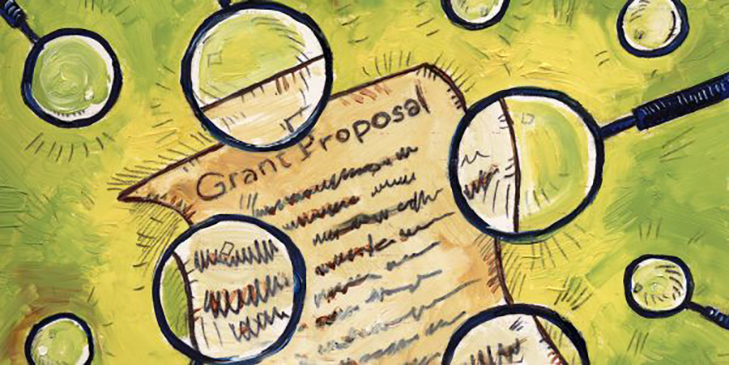Over the past eight months, TSNE’s Learning Lab has conducted interviews and a focus group with small under-resourced nonprofits to assess their needs. One of the major themes was a desire for more practical resources on identifying and applying for the right grants. In response, we asked Jessica Wilson, a development professional with fifteen years of experience, to provide some key tips on effective grant writing for the unofficial development manager, the start-up executive director, or the passionate mover-and-shaker turned fundraiser.
In this article, Jessica Wilson shares how to start identifying the appropriate grants, best practices for a winning proposal, and tips for after you receive your award letter. Wilson started her career helping youth fundraise for media projects in New York and Massachusetts. Most recently, she worked with Lowell-based community organizations UTEC, Inc. and Mill City Grows, helping them double in size over a 3-5 year period.
Where To Start?
There are many free and fee-based resources for finding foundations and grant programs that might be helpful in growing your organization.
Grant Advisor is a free site where anyone can post anonymous reviews of foundations. You can search by state to read more about different foundations and understand which ones might be a fit for your mission and how they work with grantees. This site won’t help you with the application process, however, so you’ll want to take what you learn here, and research further on GuideStar by Candid. There you can download each foundation’s IRS Form 990. This will provide contact information and giving history for most foundations. This multi-step approach does take some time, effort, and patience, but it will certainly give you a better understanding of your local funding landscape.
Philanthropy MA RFP Database is a great resource for finding funding that is compatible with your mission and geography, and membership also comes with many other great professional development resources. There are many other fee-based databases such as The Foundation Center’s Foundation Directory Online, FOUNDATIONSearch, and GrantStation. If your budget allows, I would suggest choosing one and trying it out for a year. The best tool will be the one that you enjoy using and that works for you.
If your budget doesn’t yet support a grant research tool, try some of these ideas:
- Talk to your current funders. Let them know you are on the lookout for additional funding for your project. Chances are they can help you make a connection. Plus, asking for their help and advice is a great way to continue engaging them.
- See who is funding other organizations like yours. Many nonprofits publish a list of current funders on their websites or annual reports. This could give you some ideas on foundations who may be interested in your programs.
- Ask your peers about local resources. Go to a local development professionals meetup and ask about newsletters or resources that they find helpful. The City of Boston has a variety of resources for nonprofit funding on their website, and your community may offer something similar.
Tips for a Winning Proposal
Your first step in approaching a new funder should not be your grant proposal, if you can help it. Unless the foundation clearly states they do not accept inquiries, reach out via phone or email to introduce yourself and ask some questions. Winning a grant involves lots of relationship building — it’s not like winning the lottery.
When you get down to the business of writing your proposal, make sure to answer the funder’s specific questions. Make sure you’ve addressed all of their concerns, especially how your program aligns with their goals. Even if they don’t ask directly, share background on your organization’s capacity to do the work you propose.
You will also want to include success stories in your proposals in a way that honors the dignity of your program participants. Try to interview your participants personally, use their direct quotes in your stories, make sure you have their permission and approval of the final write-ups, and try to involve your participants and program staff in the writing process in any way that’s feasible (and honors their time and yours).
DON’T change how you talk about your program simply because it “makes sense for this funder,” and DON’T promise things you don’t think you can deliver. If you find yourself doing these things, then this may not be the right grant for you and that’s ok. If the funder’s vision does not align with your organization’s vision, it may not be worth pursuing.
You’ve Won a Grant! Now What?
Congratulations on winning that grant. Remember the grant check is not the end of your relationship with the funder — it is just the beginning.
Your first “to-do” item after receiving a grant should be to acknowledge the gift. Make sure to fill out any paperwork required by the funder, and send them a thoughtful thank you letter (not the same thank you letter you send to everyone else).
Next, plan with the folks on your team who will be carrying out the proposed project to make sure everyone understands what is required: this might include attending meetings, planning site visits, tracking data, or writing reports.
Keep in touch with the funder through the project period with occasional updates – especially if an organizational change occurs such as a change in staff, or receipt of additional funding.
Make sure you note your report deadline and get that report in on time. Each time you contact the funder, you are building a relationship with them. Hopefully one that will benefit your organization’s mission for years to come!
About the Learning Lab
We’re using human-centered design to help us understand the capacity-building needs of under-resourced nonprofits in order to inform our social impact investment strategy. Read our blog post about the brand new Learning Lab.
